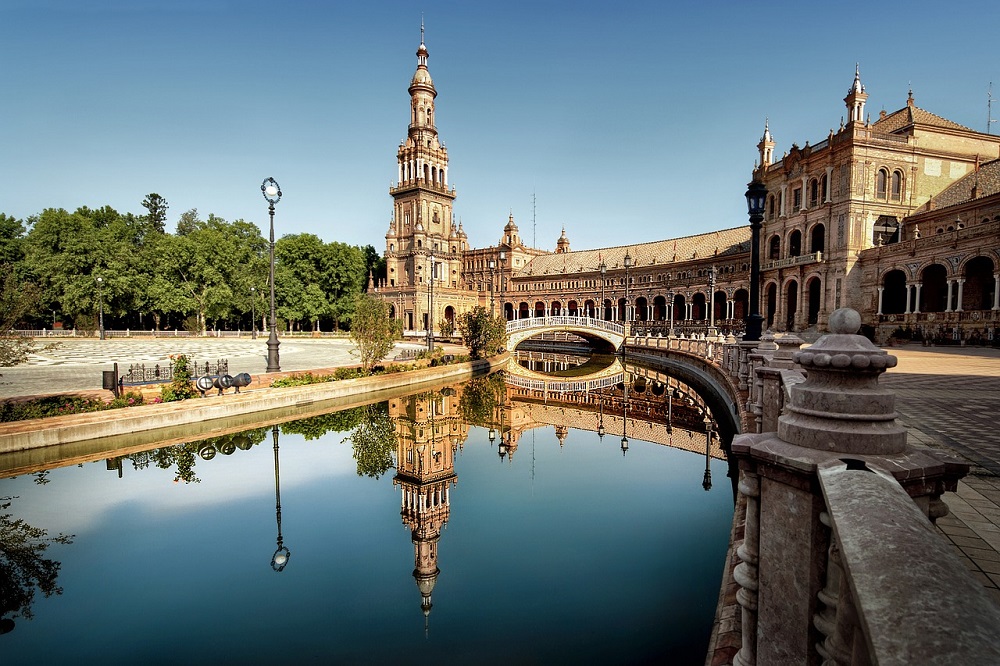Many Americans living in Spain think about buying real estate, either as a home or as a rental, but the process can be challenging if you aren’t familiar with the Spanish real estate market and purchasing procedures. In this article, we’ll provide you with useful information on how to buy a property and obtain a mortgage in Spain, to help make the process easier.
1 – Find a property
Start by researching Spanish real estate in the areas where you would like to buy. This should include real estate types and prices in your chosen areas, as well as general research about the area, such as facilities, local transport connections, and shops. Note also that if you invest more than €500,000 in a home in Spain, you will qualify for a Golden Residence Visa.
2 – Finances
You will need to ensure that you have a minimum 20% down payment, and 15% additionally on top of the price of the property for fees and taxes, which typically break down as:
- Property transfer tax: 6–10% (existing properties) / VAT (or IVA) at 10% (new properties)
- Notary costs, title deed tax, and land registration fee: 1–2.5%
- Legal fees: 1–2% (including VAT)
- The seller normally pays the real estate agent fees in Spain. Real estate agents typically charge a fixed percentage of around 3% of the sale price.
The buyer pays the notary though. The notary’s role is to certify the contract as legally binding. You also need a lawyer though, who will check the deeds and draw up the contract (more on this later on).
Before you can make an offer on a property, you will need to have either all the funds available, or agree a mortgage in principle. You are also going to require a NIE (Número de Identificación del extranjero).
3 – Obtain a NIE number
Before buying a property in Spain, you will need to obtain a foreigner identification number (NIE). This number is required to carry out any financial transactions in Spain, including opening a bank account, paying taxes, and buying a property. You can obtain a NIE from the Spanish consulate in your home country or from the Spanish National Police in Spain. NIE’s aren’t hard to obtain, but it can take some time, so this should be an early priority for you. This process can also be faciiitated using a gestor in Spain. Gestors act as an advisor and intermediary to help with many administrative procedures.
4 – Talk to a mortgage advisor
There are three ways of financing your property purchase: first, if you have the funds, you won’t need to borrow. Secondly, you may be able to obtain financing in the US, if you can borrow against assets you have there for example. And thirdly, obtaining a mortgage from a Spanish bank.
The mortgage market in Spain is sophisticated, and there are no bars on foreign citizens buying real estate or obtaining a mortgage, but you may find that you need a bigger down payment, or that you can’t access as good interest rates compared to Spaniards.
You will also have to choose between a fixed and variable rate loan. All loans are made in Euros.
5 – Get pre-approved for a mortgage
Before making an offer on a property, you should apply and get pre-approved for a mortgage. This will give you a clear idea of how much you can afford to spend on a property and help you avoid any disappointments later. To get pre-approved, you will need to provide the lender with your financial information, such as your income, expenses, and credit history, just as you would in the US.
6 – Choose the right property
When choosing a property, consider factors such as location, size, and condition. It is also important to consider the property’s potential resale value if you plan to sell it in the future. If you are buying a new property, check the developer’s reputation and the quality of the construction. You should also arrange a professional survey or inspection of the property to identify any potential issues.
7 – Make an offer
Once you have found a suitable property, it is time to make an offer. Your real estate agent can help you negotiate the price and terms of the offer. Once you and the seller have agreed on the price, you will need to sign a reservation agreement and pay a deposit to secure the property.
8 – Hire a lawyer
To ensure a smooth buying process, it is advisable to hire a lawyer who specializes in Spanish property law. A lawyer will review the purchase contract, verify that the property is free of any liens or encumbrances, and guide you through the closing process. Getting good legal advice at this stage will ensure that you avoid costly issues down the road.
You should also arrange a survey of the property to check that there aren’t any hidden structural issues.
9 – Buying real estate in Spain and US taxes
While there are Spanish taxes due on the purchase of real estate in Spain, there is no US tax implication when you buy.
If you rent out a property in Spain, you will have to declare the rental income on your US tax return. When you sell the property, you may have to pay US capital gains tax, too, although tax credits will be available if you pay Spanish capital gain taxes.
Purchasing property can trigger a reporting requirement under FBAR and FATCA rules about having financial assets abroad if you transfer the funds intended for the purchase from the US into your bank account in Spain first. You may already have to file these US foreign account and asset reporting forms, in which case you should just include the purchase funds when you do. The workaround is to transfer them straight to your attorney rather than into your own bank account in Spain.
10 – Closing the deal
The final step in the buying process is the closing. This involves signing the deed of sale and paying the balance of the purchase price, taxes, and fees. The deed of sale will then be registered with the Spanish Land Registry, and you will become the legal owner of the property.
In conclusion
In conclusion, buying real estate in Spain can be a rewarding and exciting experience for Americans. It’s important to do your research, work with experienced professionals, and understand the local laws and regulations. When it comes to mortgages, there are a variety of options available, including fixed and variable rates, and it’s essential to shop around and find the best deal for your unique situation.
By following the advice outlined in this guide, you can navigate the process of buying real estate in Spain and securing a mortgage with confidence. Remember to consider all of the factors involved, such as location, property type, and financing, and make informed decisions based on your individual needs and preferences.
With the right approach and a little bit of patience, you can make your dream of owning a piece of paradise in Spain a reality. So, start exploring the options today and take the first step towards making your Spanish real estate dream come true.
If you have any questions about financial planning as an American living in Spain, get in touch.
This article is for informational purposes only; it is not intended to offer advice or guidance on legal, tax, or investment matters. Such advice can be given only with full understanding of a person’s specific situation.





